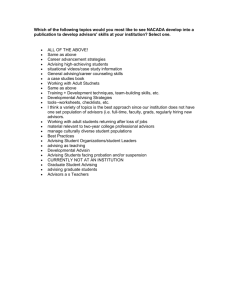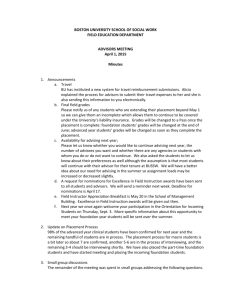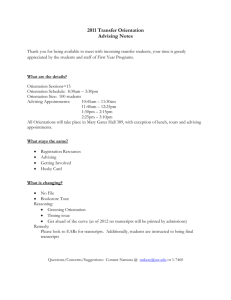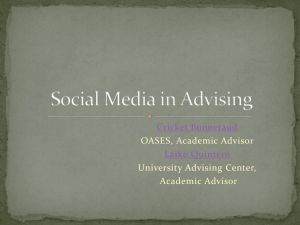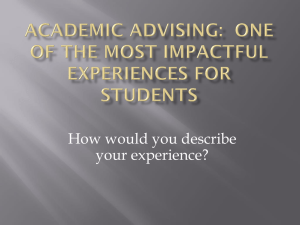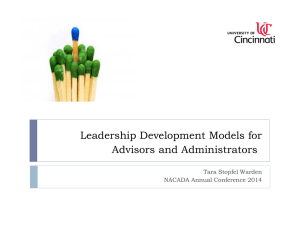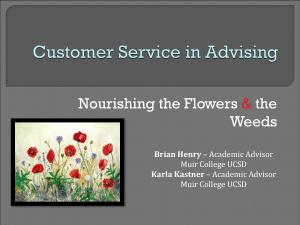New Advisor First Year Development Checklist
advertisement
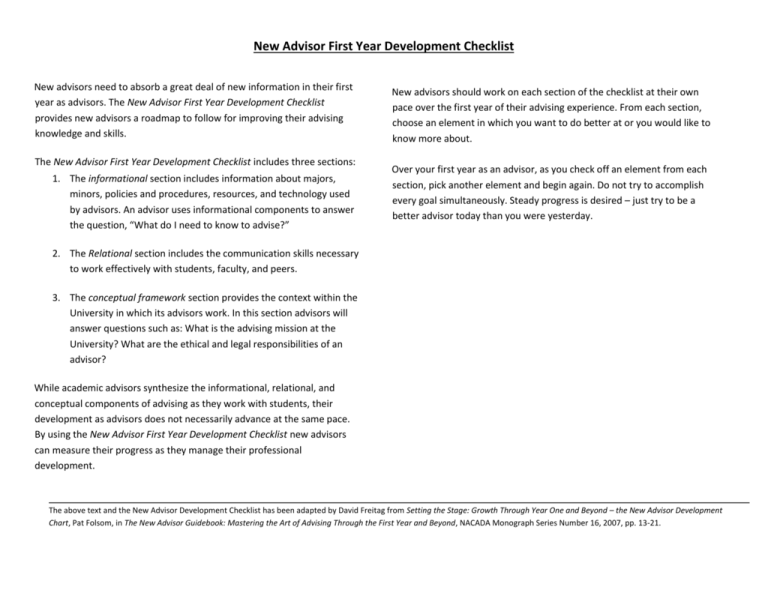
New Advisor First Year Development Checklist New advisors need to absorb a great deal of new information in their first year as advisors. The New Advisor First Year Development Checklist provides new advisors a roadmap to follow for improving their advising knowledge and skills. The New Advisor First Year Development Checklist includes three sections: 1. The informational section includes information about majors, minors, policies and procedures, resources, and technology used by advisors. An advisor uses informational components to answer the question, “What do I need to know to advise?” New advisors should work on each section of the checklist at their own pace over the first year of their advising experience. From each section, choose an element in which you want to do better at or you would like to know more about. Over your first year as an advisor, as you check off an element from each section, pick another element and begin again. Do not try to accomplish every goal simultaneously. Steady progress is desired – just try to be a better advisor today than you were yesterday. 2. The Relational section includes the communication skills necessary to work effectively with students, faculty, and peers. 3. The conceptual framework section provides the context within the University in which its advisors work. In this section advisors will answer questions such as: What is the advising mission at the University? What are the ethical and legal responsibilities of an advisor? While academic advisors synthesize the informational, relational, and conceptual components of advising as they work with students, their development as advisors does not necessarily advance at the same pace. By using the New Advisor First Year Development Checklist new advisors can measure their progress as they manage their professional development. The above text and the New Advisor Development Checklist has been adapted by David Freitag from Setting the Stage: Growth Through Year One and Beyond – the New Advisor Development Chart, Pat Folsom, in The New Advisor Guidebook: Mastering the Art of Advising Through the First Year and Beyond, NACADA Monograph Series Number 16, 2007, pp. 13-21. Informational: Knowledge of the University Policies, regulations, procedures, and deadlines Knows or knows where to find and explain to student basic (most important, used, likely to impact student) institutional policies, regulations, and procedures as well as is able to show or tell students about important deadlines. Major, minor, and certificate program requirements Knows or knows where to find the requirements for the majors and programs for which one has advising responsibility. Is able to outline requirements and course sequences to students (with resources visible). Seeks information from appropriate faculty and staff for exceptions or unusual course sequencing. Understands rationale for GE and is able to explain to students. Knows or knows where to find GE categories and is able to outline and explain to students (with resources visible). Knows or knows where to find list of courses that satisfy GE. Has course description knowledge of GE classes. General Education (GE) Courses University Resources: Counseling, Disability services, Student Success Center, Academic Advising Center, Career Center, student organizations, student health, services for specific student populations. Has general knowledge (course descriptions) about courses in majors and programs for which one has advising responsibility. Knows where to find course descriptions for GE classes and elective courses. Knows or knows how to find prerequisites (courses, placement scores, year in school) for courses in programs and is able to help students plan subsequent semesters. Knows or knows where to find referral and contact information about campus offices. Is able to explain (with information visible) service that is relevant to the student. Is able to locate office on a campus map for the student. □ Can find college policies and procedures □ Can find policies about dropping a class □ Can find academic calendar dates □ Can find major requirements □ Can read APRR and explain to students □ Can describe requirements and course sequence □ Can read Program Evaluation and explain to student □ Understands General Education program □ Can find General Education requirements □ Can describe GE requirements to students □ Can find a list of General Education classes □ Understands course descriptions of their area of responsibility □ Can find course descriptions of GE classes □ Can find prerequisites □ Can help students plan subsequent semesters □ Can find referral information for student □ Can explain services □ Can help student find the referral location on map Informational: Knowledge of Tools and Resources at the University General catalog and other university, college, or departmental publications, handouts, and Web sites Advising technology: email, student information systems, and degree audits Advising tools: checklists, handouts, and degree audits Organizational system Advising Center Is sufficiently familiar with printed and electronic resources relevant to one’s position so can use them efficiently in student conferences (i.e. locate the resource quickly and a have frequently used materials bookmarked). Learns and is able to use basic functions in advising technology, such as electronic transactions necessary to obtain necessary information about students (grades, ACT scores, current registration) and university resources, conduct student conferences, maintain student caseload and files, make referrals, and exchange information with colleagues. Is able to locate and distribute handouts to students as appropriate. Uses office handouts (e.g. checklists for specific types of student appointments) in advising situations. Develops initial, rudimentary system for organizing information in a way that allows advisor to retrieve information efficiently when working with students via phone, email, or in person. Is aware of the Academic Advising Center and the Blackboard site. □ Can find General Catalog information online □ Can find important college websites quickly □ Can use Mapworks □ Can use email □ Can use Beeline □ Maintains an effective organizational system □ Has handouts for students □ Has developed student database for personal notes □ Has created internet shortcuts for frequently used websites □ Is familiar with available information on the Blackboard site for Academic Advising □ Has completed the course for New Advisors Relational: The Art of Advising Self-knowledge Recognizes variety of advising styles among other advisors. Gains insights into personal advising style and own advising voice. May try various approaches to find a good fit for personal style. Identifies and gains insight into personal cultural assumptions. Welcoming and supporting atmosphere Sets students at ease. Verbal and nonverbal behavior communicates warmth and support. Greets students warmly. Focuses on and shows interest in student as an individual. Maintains eye contact. Uses active listening skills. Is learning to guide a conference effectively and ensures student questions are addressed while covering topics and information student needs. Stays within time parameters most of the time. Establishes expectations for students to meet (e.g. making and keeping appointments). Is usually able to match student with appropriate referral and provide standard information (i.e. gained via printed resources and websites) to student about referral resource. Seeks information and asks for help to ensure effective match of student and referral. Student conferences Effective referrals □ Recognizes advising styles of others □ Recognizes own advising style □ Tries various approaches □ Understands personal cultural assumptions □ Sets students at ease □ Greets students warmly □ Maintains eye contact, and uses active listening skills □ Guides conferences effectively □ Stays within time parameters □ Establishes expectations for students □ Knows about common referral services on campus □ Has created internet shortcuts to common referral services □ Can match student to appropriate referral service □ Has prepared a repertoire of questions □ Practices active listening □ Can help students make good decisions Interviewing and communication skills: questioning techniques and active listening Begins to build a repertoire of questions that will solicit solid information from students. Practices active listening. Decision-making strategies Begins to build strategies for helping students make good decisions (e.g. delineating pros and cons) Documentation of advising sessions Meets minimal office documentation standards. Begins to develop enhancements to documentation. □ Documents advising sessions appropriately Difficult students and student situations Recognizes when expertise is challenged and asks for help with problem students and unusual or exceptional student situations. □ Asks for help when needed Conceptual Framework Role of advising center in the institution Reads, discusses, and understands CAS standards and NACADA concepts of advising and Statement of Core Values of Academic Advising Family Educational Rights and Privacy Act (FERPA) Is trained on and has basic understanding of FERPA. Asks for clarification if in any doubt about specific situations. Advising Philosophy and Syllabus Has a written personal philosophy of academic advising. Has considered multiple theories and approaches of academic advising. □ Read CAS Standards for Academic Advising □ Read NACADA concepts of advising □ Read NACADA Statement of Core Values □ Has gone through FERPA training □ Asks for clarification when necessary □ Understands legal issues related to advising □ Has a personal philosophy of academic advising □ Understands ethical issues related to advising □ Has started developing an academic advising syllabus

